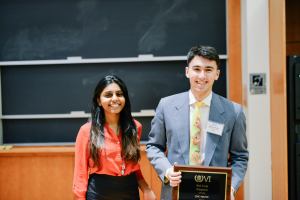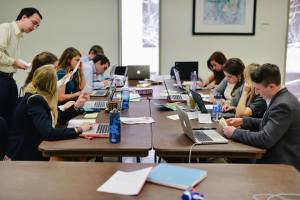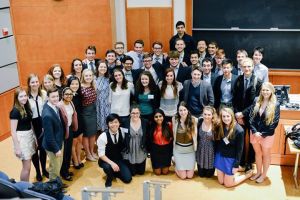The University of North Carolina at Chapel Hill hosted the 6th session of its collegiate Model United Nations conference, UNCMUNC, the weekend of February 6-8, 2015. With 160 delegates attending from thirteen top universities, the turnout nearly doubled this year, making it the most successful UNCMUNC to date. With eight committees and a variety of crises, UNCMUNC challenged delegates to tackle crises ranging from bioterrorist attacks (Centers for Disease Control and Prevention) to hacked stock exchanges (Wall Street 1980s).
Despite the disparate themes of the committees, guest speaker Cameron Ballard-Rosa addressed a common unifying “puzzle”: How do we pay for the programs we institute? Democratic leaders elude austerity to stay elected, while authoritarian governments deflate food prices to avoid urban protest. When the money runs out, however, governments face revolutions and the realization that their infrastructure might not have been so steady after all.
With these thoughts in mind, delegates were off to tackle a host of geopolitical issues. Historical committees like Wall Street and the 19th Presidium of the Communist Party challenged delegates to navigate the treacherous waters of international relations. Politburo members suppressed workers’ uprisings and revolution in Eastern Europe, while a powerful council of Western banks utilized their wealth and influence to fight fluctuating oil prices and gold reserve heists.
In the CDC, a coalition of innovative public health organizations and experimenting pharmaceutical companies successfully curbed bioterrorism on the East Coast and botulism-contaminated imports on the West. Meanwhile, in the quasi-futuristic Google[x], delegates accelerated worldwide progress by creating self-driving vehicles and artificial intelligence capable of passing the Turing test. Thwarted at every turn by privacy and liability issues, and hacked by Naxalite terrorists, delegates confronted a variety of threats the growing cybersphere will soon face.
Delegates in the JCC, on the other hand, struggled to maintain control of their own people while simultaneously competing for supremacy on the Horn of Africa. Set twenty years in the future, the JCC pitted Somalian nationalist sentiments against Ethiopian energy interests, constantly holding both committees on the brink of war. This tale of two worlds was echoed by the Hunger Games, where shifting alliances, internal dissent, and power struggles ruled the day before revolution from the Districts finally brought down the Capitol.
All of these themes, however, were present in UNCMUNC’s first ever Ad Hoc. Simulating prominent members of the opposition party at the height of Venezuelan protests, delegates were battered by constant food shortages, oppressed by a stringent state military, and buffeted by changing political winds. But for every crisis they faced, delegates were just as quick to come up with actionable steps for the future. Without a doubt, UNCMUNC’s most challenging and competitive committee to date was a rousing success.
For three days, delegates formed, deformed, and reformed strategic alliances amidst their politicking. Staff and delegates forged new relationships and rekindled old friendships. And at the end, all delegates came together one final time for awards. The following delegations were recognized:
Best Large Delegation: Vanderbilt University
Outstanding Large Delegation: Florida International University
Best Small Delegation: Princeton University

Secretary-General Srihita Bongu and Vanderbilt Head Delegate Gideon Ticho pose with the Best Large Delegation award.
The conference ended on a high note for everyone involved, and Secretary-General Srihita Bongu delivered the final remarks: “It’s truly been a humbling experience working with such accomplished, passionate, and collegial people. This conference would not have been possible if not for the energy and time dedicated to it by the most talented delegates and zealous staffers on the circuit. I am incredibly excited for the future of this conference.”






